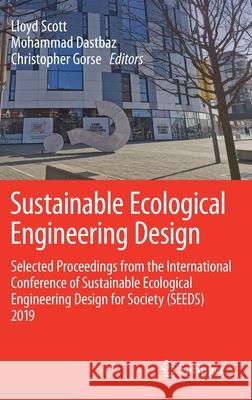Sustainable Ecological Engineering Design: Selected Proceedings from the International Conference of Sustainable Ecological Engineering Design for Soc » książka



Sustainable Ecological Engineering Design: Selected Proceedings from the International Conference of Sustainable Ecological Engineering Design for Soc
ISBN-13: 9783030443801 / Angielski / Twarda / 2020 / 500 str.
Sustainable Ecological Engineering Design: Selected Proceedings from the International Conference of Sustainable Ecological Engineering Design for Soc
ISBN-13: 9783030443801 / Angielski / Twarda / 2020 / 500 str.
(netto: 575,06 VAT: 5%)
Najniższa cena z 30 dni: 578,30
ok. 16-18 dni roboczych.
Darmowa dostawa!
Preface
Through research and proven practice, the aim of the International Conference of Sustainable Ecological Engineering Design for Society (SEEDS) is to foster ideas on how to reduce negative impacts on the environment while providing for the health and well-being of society. The professions and fields of research required to ensure buildings meet user demands and provide healthy enclosures are many and diverse. The SEEDS conference addresses the interdependence of people, the built and natural environments, and recognizes the interdisciplinary and international themes necessary to assemble the knowledge required for positive change.
- Presents leading-edge research at the intersection of sustainability, ecology, engineering, and design
- Energy, building performance, and physics research is examined within the context of health, life quality, and ecology
- Covers energy efficiency, modeling energy performance, retrofitting, lighting, green materials, low-carbon building design, lean construction, and historical preservation
1997-2026 DolnySlask.com Agencja Internetowa
KrainaKsiazek.PL - Księgarnia Internetowa









